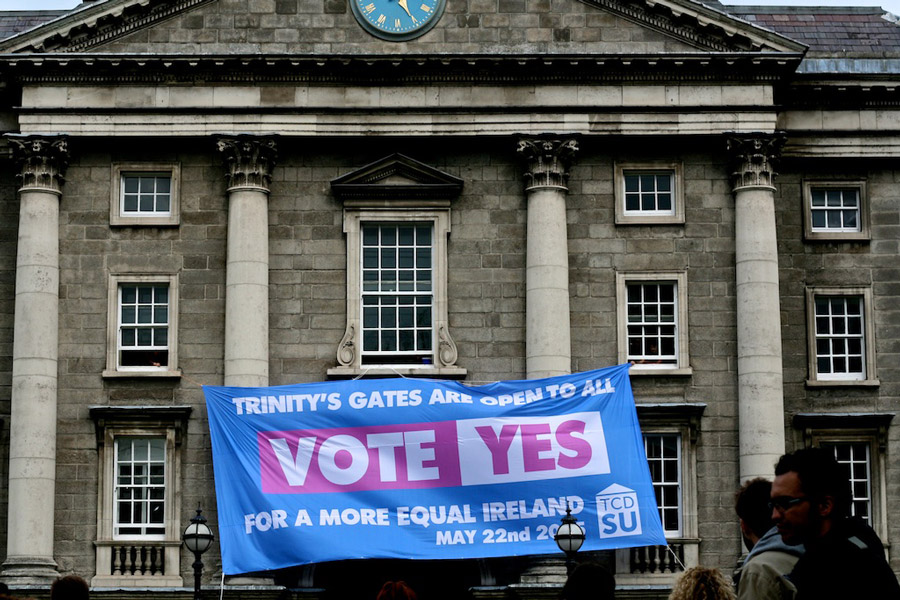As an LGBT community, we stand at a transformative point. In the wake of the horrific attack in Orlando, many within and beyond this community will begin to consider the progress that has been made and the steps that still urgently need to be taken to ensure both the safety and broader equality of LGBT individuals in our society. Though many of the barriers and laws that have “othered” queer people are being dismantled and we’ve had immense victories in the past year, we nevertheless have a long way to go. To argue that we are done with the fight for LGBT rights ignores the massive steps our society needs to take to truly value our LGBT citizens. There are several key areas – including mental health, gender recognition and homophobia – that need to be addressed.
Marriage equality will always be a defining memory of 2015. The enthusiastic surge of the student movement behind marriage equality was empowering and something never politically seen before. Watching the “yes” votes stack up as results came in from all over the country was an exceptional experience. Following this exciting change, you’d assume that all Trinity students born on this island would now share this right to marry, but unfortunately students from Northern Ireland do not. A provision for marriage equality needs to be made in Northern Ireland to ensure all Trinity students have equal rights when they go home.
Greater alcohol and drug abuse among queer people and the impact this has on mental health isn’t taken into account in national campaigns
Mental health is starting to get the attention and funding it deserves in Ireland, but the higher rate of mental health difficulties among LGBT youth is often ignored in the discussions surrounding mental health. Greater alcohol and drug abuse among queer people and the impact this has on mental health isn’t taken into account in national campaigns. To protect LGBT young people, we need to deconstruct the factors that cause these problems and work towards resolving them specifically for LGBT people.
The passing of the Gender Recognition Bill was a welcome step forward in providing recognition for trans people in Ireland, enabling them to be legally recognised by the state in their true gender. Despite this progress, we still need to fight for improvements so that the state can provide for those under 16 and have proper recognition for non-binary people. On a college level, gender neutral bathrooms are not available in every college building and sometimes not available at all at events run by Trinity College Dublin Students’ Union (TCDSU) events. This small consideration can make students feel more comfortable in their learning environment.
The rate of new HIV infections among men who have sex with men went up in 2015 for the first time in years. There is continued stigma around HIV-positive people and a misunderstanding about modern HIV prevention strategies. In a broader context, not enough people are getting tested regularly and having open conversations with sexual partners about how recently they’ve been tested. This needs to be dealt with by educating our student body and encouraging all people to take pride in regularly getting tested for STIs and being responsible about their own decisions.
We must always remember that progress is not linear – every time someone says “fag”, every time a kid is picked on for being queer, we take a step backwards
Homophobia and transphobia are still unsettlingly common, as we were boldly reminded by the horrifying attack on Pulse nightclub in Orlando. We don’t have to go as far as America to see it: Ireland manager Martin O’Neil made a tone-deaf joke about “queers” and the media largely wrote it off as banter. The remark is particularly biting given the continuing problem of homophobia in sport, suggesting that this attitude is clearly persistent among those at the top. As a society, when we allow remarks like this to pass unchallenged, or allow media to whitewash out the homophobic motive of the Orlando attack, we are complicit in casual queerphobia that affects people every day.
As I reflect on the problems faced by the LGBT community, I can only speak from my own experience. The real step every person needs to take is to listen to one another. The LGBT community is as vast and diverse as the population of the world – neither I nor anybody else can purport to represent that entire community. If we, as a community, start listening to the needs and difficulties of each other we can work towards a more equal and inclusive society for all our citizens.
As Trinity students, we live in a relatively safe space. We must always remember that progress is not linear – every time someone says “fag”, every time a kid is picked on for being queer, we take a step backwards. The big steps are important, but every day we should strive to move our community forward – our entire community, not just those within the four walls of Trinity.
Sean O’Carroll is the incoming LGBT Rights Officer of Trinity College Dublin Students’Union.







